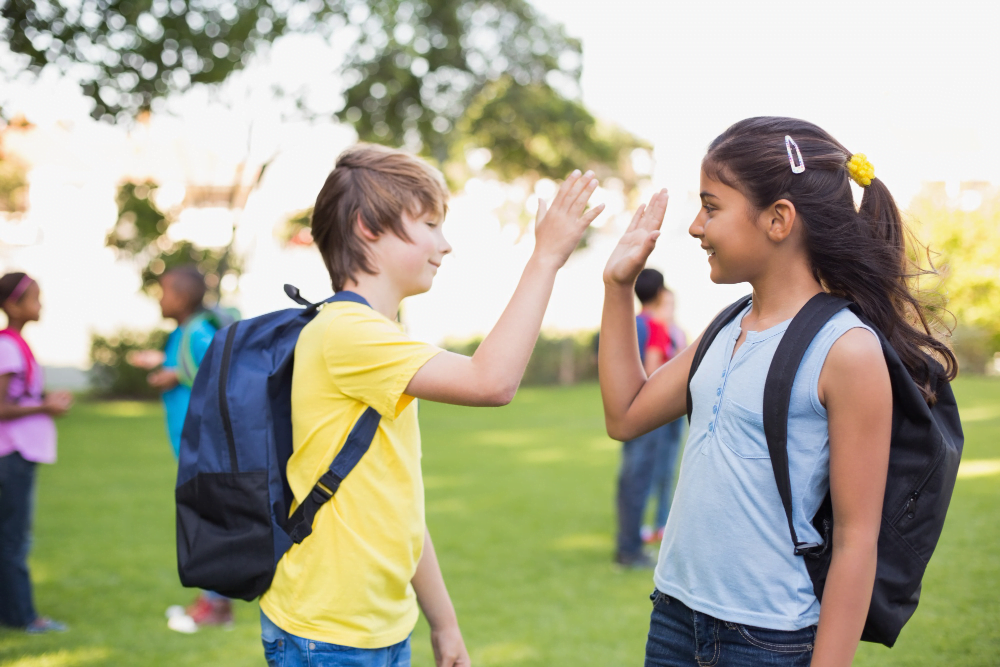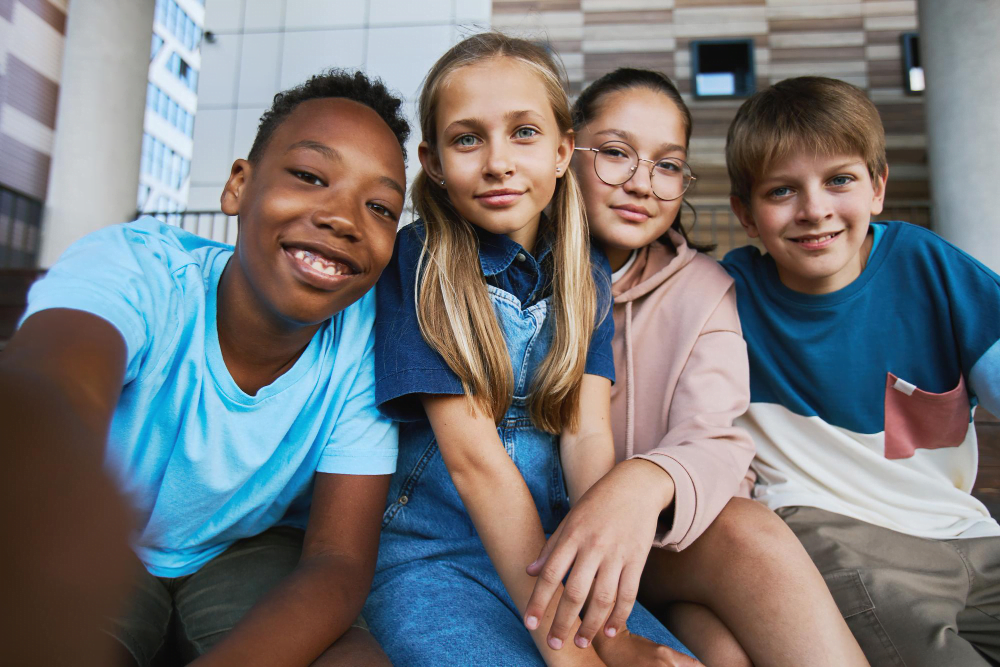Making friends at school as a kid can be challenging, but it’s essential for a happier school experience. This guide provides practical tips to help kids develop meaningful and long-lasting friendships.
1. Join Clubs and Activities
Joining clubs and activities helps kids find like-minded people and develop common interests. This is a great way to meet new friends and build confidence.
Find Common Interests
Finding common interests is vital for forming friendships.
- Discover areas of interest – Explore various clubs, sports, and classes.
- Attend regularly – Consistency helps bond over shared activities.
- Engage in group conversations – Interacting with peers builds rapport.
Joining interest-based clubs enhances the chances of meeting others who share similar passions and hobbies.
Show Enthusiasm
Enthusiasm is contagious and can attract potential friends.
- Be genuinely enthusiastic – Show excitement for the activities.
- Participate actively – Active participation shows commitment and interest.
- Compliment others – Appreciate others’ contributions.
Showing enthusiasm makes kids more approachable and helps them make a lasting impression.
These activities and attitudes will help kids in their journey of making friends at school by providing opportunities and social settings to connect meaningfully with peers.
2. Be Approachable and Smile
Being approachable and smiling can significantly improve a kid’s chances of making friends. These simple gestures can make others feel comfortable and welcome.
Positive Body Language
Positive body language plays a crucial role in making friends.
- Maintain good posture – Stand straight to show confidence.
- Make eye contact – It shows you are interested and present.
- Nod in agreement – This shows you are actively listening.
Positive body language conveys openness and friendliness, which encourages others to approach.
Open Stance
An open stance is another way to invite interaction.
- Avoid crossing arms – This can seem defensive or unapproachable.
- Face others when talking – Shows you are engaged and interested.
- Keep an inviting posture – Stand or sit in a manner that suggests you’re ready to interact.
An open stance helps kids seem more friendly and interested, making it easier for others to initiate conversation.
3. Start Conversations with Classmates
Starting conversations with classmates is fundamental to making friends. It can seem daunting at first, but with practice, it becomes second nature.
Use Open-Ended Questions
Open-ended questions foster engaging conversations without pressure.
- Ask about activities – “What did you do over the weekend?”
- Inquire about interests – “What’s your favorite book or movie?”
- Discuss common experiences – “What did you think of the homework?”
Open-ended questions encourage thoughtful responses and keep the conversation flowing.
Share Personal Stories
Sharing personal stories helps create a connection.
- Be relatable – Share stories that others can relate to.
- Be genuine – Authentic stories resonate more.
- Balance the conversation – Share, but also listen actively.
Personal stories provide a glimpse into who you are and can spark meaningful conversations, laying the groundwork for a deeper friendship.
4. Offer Help and Be Supportive
Offering help and being supportive fosters trust and shows good character. These actions demonstrate empathy and genuine care for others.
Show Empathy
Empathy is crucial for developing strong friendships.
- Listen actively – Pay attention to others’ feelings and concerns.
- Show understanding – Express that you understand their emotions.
- Offer comfort – Provide reassurance when they’re feeling down.
Showing empathy helps kids connect on an emotional level, making their friendships deeper and more meaningful.
Be a Good Listener
Being a good listener is a valued trait in any friendship.
- Pay full attention – Avoid distractions like phones.
- Reflective listening – Briefly repeat what the other person said.
- Ask follow-up questions – Show you’re interested in their thoughts.
Good listeners make others feel heard and valued, which is essential in forming genuine friendships.
5. Take Part in Group Projects
Participating in group projects offers opportunities to collaborate and communicate, paving the way for new friendships at school.
Share Ideas Openly
Sharing ideas openly can foster better group dynamics.
- Be proactive – Don’t hesitate to contribute your thoughts.
- Encourage others – Invite input from all group members.
- Respect different viewpoints – Understand that everyone’s opinion matters.
Sharing ideas shows that you’re engaged and respectful of others’ contributions, which can lead to mutual respect and friendship.
Collaborate Effectively
Effective collaboration is key to successful group projects.
- Divide tasks fairly – Ensure everyone has a role.
- Communicate clearly – Keep the group updated on progress.
- Offer help when needed – Provide assistance to group members struggling with their tasks.
Collaboration builds teamwork skills and often leads to the development of new friendships through shared goals.
6. Invite Classmates to Spend Time Outside School
Inviting classmates to hang out outside school strengthens friendships by allowing kids to bond in a different environment.
Plan Fun Activities
Planning engaging activities can make outings enjoyable.
- Organize playdates – Invite classmates to a nearby park.
- Plan movie nights – Watch a popular film together.
- Arrange study groups – Combine learning with social time.
Fun activities give kids common experiences to talk about and enjoy together, which can strengthen their bonds.
Show Initiative
Taking the initiative helps foster strong connections.
- Be the first to ask – Don’t wait for others to invite you.
- Follow up – Ensure plans are confirmed and carried out.
- Be inclusive – Invite a variety of classmates, not just close friends.
Showing initiative demonstrates friendliness and willingness to deepen the connection, making others more likely to reciprocate.
7. Be Yourself and Stay Genuine
Being oneself and staying genuine is essential for forming authentic and lasting friendships. Authenticity attracts individuals with similar values and interests.
Embrace Individuality
Embracing individuality helps kids stand out positively.
- Be proud of your uniqueness – Celebrate what makes you different.
- Share your passions – Talk about what you love to do.
- Avoid pretending – Don’t change to fit in; be true to yourself.
When kids embrace who they are, they attract like-minded people who appreciate them for their true selves.
Stand Strong in Your Values
Adhering to personal values builds character and respect.
- Practice integrity – Be honest and stand by your beliefs.
- Respect others’ values – Accept and appreciate differences.
- Lead by example – Show others the power of authenticity.
Staying genuine and valuing integrity create an environment of mutual respect, fostering meaningful and trustworthy friendships.
8. Compliment Others Sincerely
Sincere compliments can help kids build rapport and demonstrate that they notice and appreciate positive traits in others, fostering goodwill and stronger friendships.
Notice Their Strengths
Identifying and acknowledging others’ strengths can create a positive impact.
- Be observant – Pay attention to classmates’ talents and good qualities.
- Compliment specific traits – Focus on something genuine and specific.
- Use positive language – Frame compliments to uplift and encourage.
Observing and mentioning specific strengths makes compliments more genuine and impactful.
Express Genuinely
Genuine compliments build trust and camaraderie.
- Be honest – Ensure your compliments are authentic.
- Deliver compliments naturally – Don’t force or exaggerate your praise.
- Smile while complimenting – A smile reinforces sincerity.
Genuine expressions of appreciation strengthen bonds and show that kids value and respect their peers.
9. Respect Others’ Boundaries
Respecting others’ boundaries is crucial for creating a comfortable and trusting environment, which is essential for developing strong friendships.
Understand Personal Space
Understanding personal space shows respect for others’ comfort.
- Keep a considerate distance – Maintain appropriate physical space.
- Observe body language – Recognize signs of discomfort.
- Ask before initiating physical contact – Ensure consent for hugs or touches.
Respecting personal space makes others feel safe and respected, which is fundamental to any friendship.
Respect Different Opinions
Accepting diverse viewpoints fosters mutual respect and understanding.
- Listen actively – Pay attention to different perspectives.
- Avoid arguments – Respect differing opinions without conflict.
- Encourage open dialogue – Be open to learning from others.
Respecting varied opinions creates a supportive environment where all parties feel valued.
By respecting boundaries, both physical and ideological, kids create a space built on mutual respect and trust, which is key for strong and lasting friendships.
10. Be Consistent in Your Friendship Efforts
Consistency in friendship efforts is vital for building trust and reliability, key components of any meaningful relationship.
Follow Up Regularly
Regular follow-ups show genuine interest and build stronger connections.
- Check-in frequently – Ask how your friends are doing.
- Plan regular hangouts – Create recurring opportunities to spend time together.
- Acknowledge important events – Remember birthdays and special occasions.
Consistent communication and follow-ups demonstrate care and investment in the friendship.
Show Long-Term Care
Long-term care ensures the friendship endures over time.
- Be there in tough times – Support friends through their ups and downs.
- Celebrate successes – Share joy in their achievements.
- Maintain contact – Even when apart, keep the communication lines open.
Showing long-term care builds a solid foundation for a lasting friendship, strengthening the bond with each passing day.
Being consistent in friendship efforts reassures friends of your reliability and commitment, leading to deeper and more enduring relationships.
Final Thoughts

Making friends at school as a kid can seem challenging, but with the right approach, it becomes manageable. Kids can develop meaningful and lasting friendships by joining clubs, showing enthusiasm, starting conversations, being supportive, participating in group projects, inviting classmates to spend time outside school, being genuine, complimenting others sincerely, respecting boundaries, and staying consistent. These social skills not only enrich their school experience but also lay the foundation for positive social interactions throughout life.



